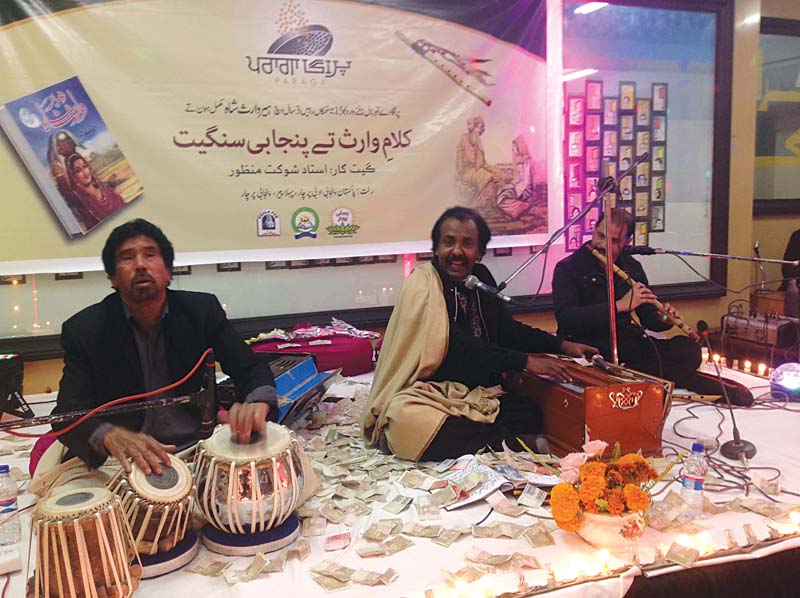
ISLAMABAD: Commercial activities and construction are not the only ventures happening in town. Dodging cranes, side-stepping the ditches and potholes, and driving through the clouds of dust, some enthusiasts still do manage to reach secluded places to attend musical and literary evenings however few in the city. These are the evenings that are keeping the beat in the city’s heart alive.
Paraga, an organisation working for promotion of literature, on Saturday organised a musical evening at the Pakistan Academy of Letters (PAL) to celebrate successful culmination its weekly recitation of Heer Ranjha by Waris Shah, which lasted for as many as 156 Wednesdays, organised jointly by the Pakistan Punjabi Adabi Parchar, Pehla Per, and Punjabi Parchar.
Rawalpindi-based kafi and folk singer Shaukat Manzoor sang Heer Ranjha — a love saga written nearly three centuries ago in southern Punjab — mesmerising the audience with a fair share of women in attendance, harkening them back to the true spirit of the region.
In his opening remarks, Tariq Bhatti of Paraga said that the moving spirit behind the initiative was that it was time to understand the classical texts and not just eulogise the poets.
Every Wednesday, a dozen people gather at the Writers’ House of the academy to recite, discuss and understand the text, a beaming Bhatti said.
“Wednesday, which in Urdu is “Budh” means knowledge. Buddha, in the same vein, is someone who is knowledgeable,” he explained.
Writer of critically-acclaimed book “Media Mandi”, Akmal Shahzad Ghumman earlier said that he had thought he understood Heer but the animated discussions and diverse perspectives during the sessions gave him new insights into the text.
He said that Waris Shah in his 620 something stanzas weaved a social narrative into a romantic saga, which made it all the more popular. The legend itself was already part of rural consciousness. As many as 16 poets tried their hand at Heer before Waris Shah. It was obviously the treatment that could make the difference. Ghumman said the sufi poet went about chronicling the era he was in using the popular vehicle of story-telling and penned the legend in 1766.
Talking about Shah’s poetic genius Ali Akbar Natiq said unlike other great poets Shah has not used the crutches of war, religion or other historical references to create a masterpiece.
He said that castes and their roles in a village economy were part of Shah’s narrative.
“Intricately threaded is the divergence of outlook between clergy and the common man, the gradual ascendance of the business class and decline of the landed-aristocracy and religious harmony,” he said.
“Women characters of Heer and her sister-in-law Seihti lead the narrative. They are stronger and brainier than their male counterparts,” he said.
Bhatti said Shah’s epic is nothing if not portrayal of everyday life of the 18th Century Punjab.
Artist Farhad Iqbal and poet Hazrat Sham sang a stanza each from Heer, whereas poet Saeed Doshi paid tribute to the bard in verse.
Later in the evening, Shaukat Manzoor sang Amrita Pritam’s famous poem “Aj akhan Waris Shah noon” as a tribute to martyred students of Bacha Khan University in Charsadda. The rendition in Raga ‘marwa’ had a somber effect on the audience which was further accentuated by the creative play of lights.
Jawad Ahmed accompanied Manzoor on flute, while Ijaz Hussain was on the tabla.
Going beyond Heer, Manzoor also sang other popular folk and classical songs.
The closing stroke came in the form of dhamal on the everpopular “Dam mast qalandar, mast mast.”
Explaining about Waris Shah’s poetry, Poet Manzar Naqvi, said, “these texts tell us of a society that does not discriminate on the basis of caste and creed.”
Paraga has now moved on to reading Baba Farid.
Published in The Express Tribune, January 25th, 2016.


















































COMMENTS
Comments are moderated and generally will be posted if they are on-topic and not abusive.
For more information, please see our Comments FAQ